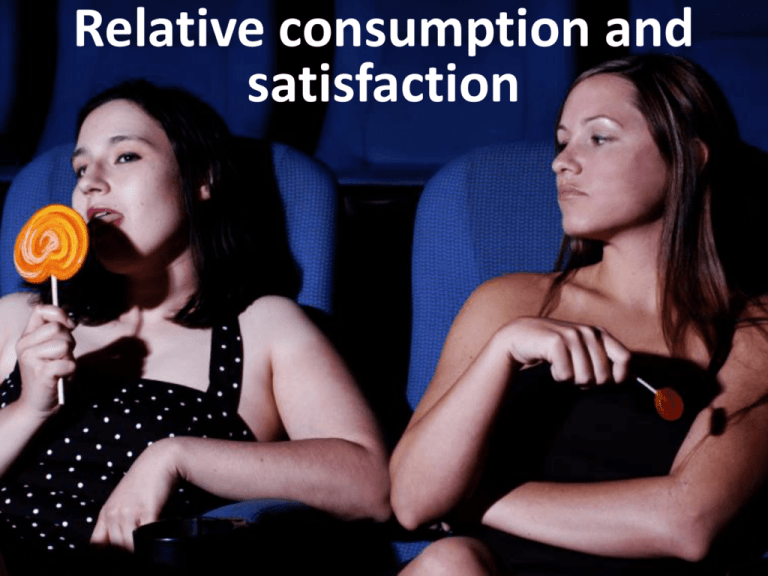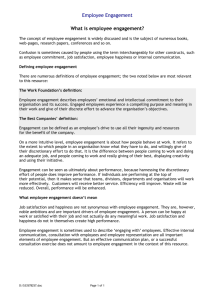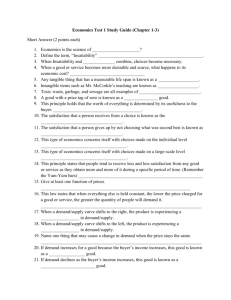Relative Consumption
advertisement

Relative consumption and satisfaction A fundamental idea of standard economics: Higher income means greater consumption and therefore greater utility and satisfaction But, some pieces of the puzzle don’t seem to fit! B. Frey (U. Zurich), A. Stutzer, 2002, What can economists learn from happiness research? Journal of Economic Literature, 40, 402-435. Daniel Kahneman (Princeton) and Alan B. Krueger (Princeton), 2006, Developments in the Measurement of Subjective Well-Being, Journal of Economic Perspectives, 20(1), 3-24. A. Clark, P. Frijters, and M. Shield, 2008, Relative Income, Happiness, and Utility: An Explanation for the Easterlin Paradox and Other Puzzles, Journal of Economic Literature, 46(1), 95–144 A. Clark, P. Frijters, and M. Shield, 2008, Relative Income, Happiness, and Utility: An Explanation for the Easterlin Paradox and Other Puzzles, Journal of Economic Literature, 46(1), 95–144 Both authors— Daniel Kahneman (a psychologist) and Angus Deaton (an economist)—have separately won the Nobel Memorial Prize in Economics. Their research inspired the event described in the next slide In The News At about the 1:20 point in this CBS News video report, Dan Price explains that his decision was influenced by the research by Kahneman and Deaton: see https://youtu.be/KJxVRN Ndgl4 Why don’t we see national subjective wellbeing rising with national income? Standard economics • More money means greater consumption and therefore greater utility and satisfaction Behavioral economics • My level of satisfaction depends upon my relative consumption v. those in my comparison group Some goods are more “positional” Goods where relative level is key • Cars • Houses • Fashion • Professional attire • Income Goods where absolute level is key • Health • Safety • Relationships • Vacation time S. J. Solnick (U. Vermont) & D. Hemenway (Harvard), 2005. Are positional concerns stronger in some domains than in others? American Economic Review, 95, 147-151 “Conspicuous Consumption” • Thorstein Veblen • Theory of the Leisure Class (1899) • “Conspicuous Consumption” when people prefer a good because it is more expensive. The display of the item projects relative standing. Conspicuous consumption • Shipping magnate Aristotle Onassis wanted a special yacht • Christina – 325 ft. • Barstools with whale ivory footrests and leather made from whale penis. • Mosaic tile floor of swimming pool rose to become a dance floor. Relative standing in conspicuous consumption • Shipping competitor, Stavros Niarchos built the Atlantis II with the instruction of making it 50-ft longer than the Christina. • 1990 Turama, 3-ft longer than the Atlantis II • Etc., Etc. You graduate from college and your income changes from $0 to $29,000. Your friends all get jobs making $50,000. How do you feel? Standard economics • More money means greater consumption and therefore greater utility and satisfaction • $0 v. $29,000 Behavioral economics • My level of satisfaction depends upon my relative consumption v. those in my comparison group • $29,000 v. $50,000 Which world would you choose? World A: You and your family live in a neighborhood with 3,000 sq. ft. houses, the rest of the town lives in neighborhoods with 2,000 sq. ft. houses. World B: You and your family live in a neighborhood with 4,000 sq. ft. houses, the rest of the town lives in neighborhoods with 6,000 sq. ft. houses. Relative income and hedonic adaptation Dan Ariely’s “The truth about relativity” http://www.youtube.com/watch?v=mAc2VdnK78c Relative income and life satisfaction Study: A panel study of about 10,000 people in 965 different neighborhoods Question: Comparing individuals with the same income, do they feel worse when others around them have more income? What do you think? a) People feel less happy when the income of those around them goes up. b) People feel more happy when the income of those around them goes up. c) People are unaffected by what those around them earn. Luttmer, E. (Harvard), 2005, Neighbors as negatives: Relative earnings and well-being. Quarterly Journal of Economics, 120(3), 963-1002. Relative income and life satisfaction Finding: “higher earnings of neighbors are associated with lower levels of self-reported happiness.” It appears that people have “utility functions that depend on relative consumption in addition to absolute consumption.” Luttmer, E. (Harvard), 2005, Neighbors as negatives: Relative earnings and well-being. Quarterly Journal of Economics, 120(3), 963-1002. Global results from World Values Survey R. Inglehart, Modernization and Postmodernization (Princeton, 1997). Overall income may still be important for life satisfaction in relatively poor nations. R.Inglehart and H-D. Klingemann, "Genes, Culture and Happiness," MIT Press, 2000. R.Inglehart and H-D. Klingemann, "Genes, Culture and Happiness," MIT Press, 2000. Income effect weakens for the top half Average Happiness Rating Average Happiness By U.S. Income Decile (1994-1996) 2.5 50th percentile of income 2.4 2.3 2.2 2.1 2 1.9 0 10000 20000 30000 40000 50000 60000 Household income / (√Household Members) 70000 Original chart from B. Frey (U. Zurich), A. Stutzer, 2002, What can economists learn from happiness research? Journal of Economic Literature, 40, 402-435. Similar results from 35 years ago Average Happiness Rating Average Happiness by US Income Decile (1972- 1974) 2.5 50th percentile of income 2.4 2.3 2.2 2.1 2 1.9 0 10000 20000 30000 40000 50000 60000 Household income / (√Household Members) 70000 Original chart from B. Frey (U. Zurich), A. Stutzer, 2002, What can economists learn from happiness research? Journal of Economic Literature, 40, 402-435. Relative standing and peer effects • If we are doing well compared to those around us we tend to be satisfied and complacent. • If we are doing poorly compared to those around us, we tend to be dissatisfied and driven to action. If you want to work on acquiring MORE of something, focus on those who have MORE of it than you do. I need to work harder I am the BEST If you want to be satisfied with your current level of something, focus on those who have LESS of it than you do. Suppose two married women’s husbands make identical salaries. If one woman’s husband makes less money than her sister’s husband, does this make her a) Less likely to be employed outside the home? b) More likely to be employed outside the home? c) No impact Sisters and relative income Neumark, D. (Michigan State) & Postlewaite, A. (U. Penn), 1998, Relative income concerns and the rise in married women’s employment. Journal of Public Economics, 70, 157-183. Sisters and relative income Among married women with a sister who was not employed, the probability of the woman’s own employment rises 16-25% if her sister’s husband makes more than her husband. Neumark, D. (Michigan State) & Postlewaite, A. (U. Penn), 1998, Relative income concerns and the rise in married women’s employment. Journal of Public Economics, 70, 157-183. Problem: Relative standing drives satisfaction. Increasing one person’s relative standing has a negative impact on another person’s relative standing. Question: Is there any way to increase your perceived relative standing without reducing someone else’s? By focusing on those in need through volunteering, philanthropy, or compassion, we reshape our personal environment of relative standing. Does this increase life satisfaction? “Volunteers report higher well-being scores than non-volunteers; they are less depressed, and their mortality rate is lower than average” Meier, S. (Harvard), 2006, The economics of non-selfish behavior. Edward Elgar Publishing: Northampton, MA. p. 43 Volunteering, happiness, & causation When people lost volunteer opportunities, subsequent happiness ratings declined, suggesting that volunteering was causing happiness (not only vice-versa). Meier, S. (Harvard) & Stutzer (U. Zurich), 2008, Is Volunteering Rewarding in Itself? Economica, 75, 39-39. Giving and Happiness In a study of charitable giving decisions made while in an fMRI machine, charitable giving was “associated with neural activation similar to that which comes from receiving money for oneself.” Harbaugh, W. T. (Oregon), Mayr, U. (NBER), & Burghart, D. R. (Oregon), 2006, Neural responses to taxation and voluntary giving reveal motives for charitable donations. Science, 316, 1622-1625 • It’s not just about the charity receiving money, it is about us voluntarily making the gift • “neural activity … as well as subjective satisfaction, is larger in the voluntary than in the mandatory situation.” Harbaugh, W. T. (Oregon), Mayr, U. (NBER), & Burghart, D. R. (Oregon), 2006, Neural responses to taxation and voluntary giving reveal motives for charitable donations. Science, 316, 1622-1625 Standard economics • More money means greater consumption and therefore greater utility and satisfaction Behavioral economics • My level of satisfaction depends upon my relative consumption v. those in my comparison group If you want to work on acquiring MORE of something, focus on those who have MORE of it than you do. I need to work harder I am the BEST If you want to be satisfied with your current level of something, focus on those who have LESS of it than you do. Spirit Level • Many more examples in the book








